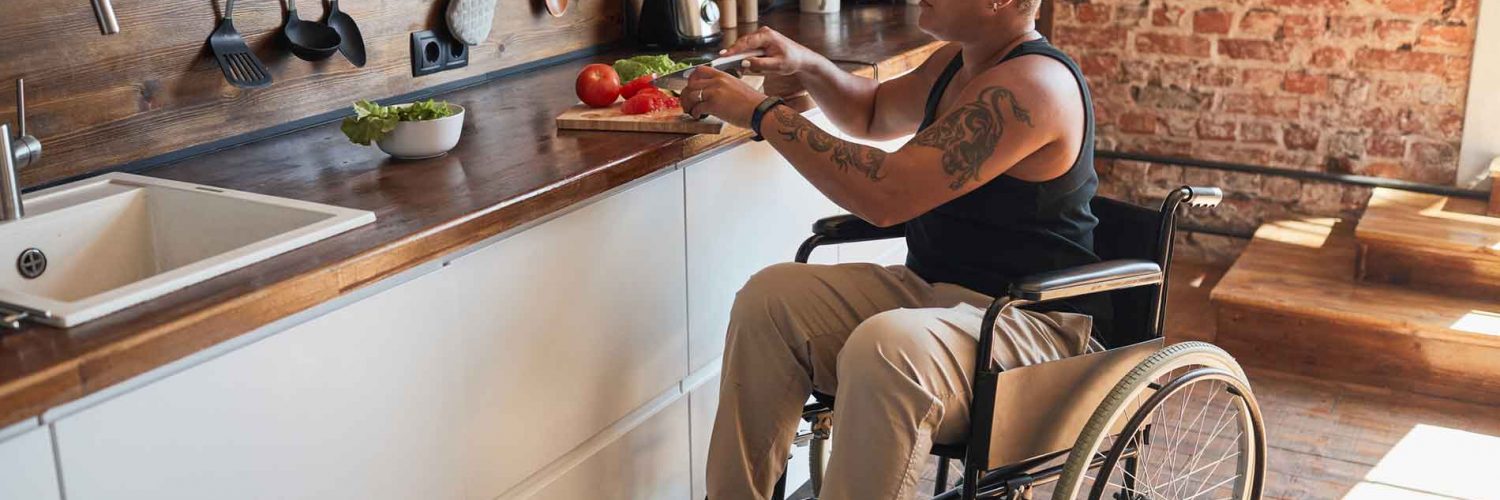Adaptive kitchen utensils can help people with disabilities prepare and enjoy their favorite foods and beverages. The following lists ten types of adaptive kitchen utensils you might want to consider for yourself or a loved one.
Need Bathroom Assistance?
Check out our list of essential handicap bathroom accessories.
What Are Adaptive Utensils And Who Are They For?
Adaptive kitchen utensils are devices that allow people with special needs or disabilities to prepare and eat meals while maintaining independence and comfort. Adaptive eating utensils come in a variety of forms to meet different needs.
Weighted utensils can assist those dealing with the effects of Parkinson’s Disease, while someone recovering from a recent stroke or dealing with arthritis could benefit from using a universal cuff. Adaptive kitchen utensils, adaptive silverware, and various adaptive equipment for drinking assist a variety of different needs, including those navigating through life with:
- Parkinson’s Disease
- Arthritis
- Stroke Recovery
- Autism
- Multiple Sclerosis
- Dementia
- Alzheimer’s Disease
10 Types of Adaptive Kitchen Utensils
1. Weighted Utensils

Weighted utensils are assistive devices for eating that benefit people who experience hand tremors due to Parkinson’s Disease or some other affliction. A weighted spoon and fork work to counteract the effects of these tremors, making it easier to keep food from spilling off and back onto the plate or table. Check out this set of weighted adaptive silverware from Special Supplies, which includes a bendable bonus feature for added adaptability.
2. Universal Cuff

A universal cuff is a device that helps secure eating utensils for elderly or disabled people. These straps typically consist of an elastic band that fastens to the hand and utilizes a built-in utensil pocket on the palm side where utensils such as forks or knives can slide in and be secured. Check out this Universal Cuff from Sammons Preston, which features a cushioned foam grip to ensure comfort and safety.
3. Rocker Knife

A rocker knife features an ergonomic, easy-grip handle positioned directly above a rounded blade, making it simple to cut through even the toughest steaks with one hand. Rocker knives are a great addition to any collection of eating utensils for disabled people or those with limited hand strength or dexterity. Check out the Rocker Knife from DMI, which features a stainless steel blade and a vertical grip to ensure a comfortable and easy meal.
4. Swivel Utensils

Swivel utensils utilize a built-in swivel mechanism and assist in keeping the utensil level for people who experience difficulty with coordination or overall wrist movement. While keeping the utensil level with limited swinging or rotation, these swivel mechanisms allow for an effortless experience in scooping up food. Check out this Swivel Utensil set from Rehabilitation Advantage, which includes a fork, a spork, a soup spoon, and a teaspoon.
5. Cylindrical Foam

Built-up utensils or built-up handles typically come in cylindrical foam, which is designed to slip around a spoon, fork, or knife handle. Essentially, this soft-grip foam builds up the diameter of the handle and allows people with weakened hands or limited mobility to securely hold the utensil during mealtime. This set of Foam Tubing from Full comes with eight pieces in four different sizes to fit various sized utensils.
6. Adaptive Dining Set

Adaptive dining sets are typically designed to assist Alzheimer’s patients or people experiencing low vision. Dining sets such as the Redware Deluxe Dining Set feature bold colors to contrast with food. Some studies even suggest that the red color increased the food intake of Alzheimer’s patients by nearly 25% and liquid intake by almost 85%.
7. Adaptive Cups

Adaptive equipment for drinking comes in multiple forms to meet various needs. Ranging from a spill-proof cup with straw to sippy cups for disabled adults, these adaptive drinking aids ensure that maintaining hydration or simply enjoying a hot cup of tea remains an independent, safe, and mess-free experience. Check out the Independence 12-ounce mug from Providence Spillproof.
8. Adaptive Dining Plate Guards

Using adaptive plate guards is a great way to help people who have difficulty scooping food or who may only have the ability to use one hand. Raised edges typically attach around any standard plate and provide a curved or straight edge to push food up against for easy scooping. Food will no longer be pushed off the plate, and the user will regain that sense of independence when mealtime comes around. Check out this Plate Guard from Sammons Preston that easily clips onto any standard plate.
9. Adaptive Dining Bowls

Utilizing weighted or suction-based bottoms, adaptive dining bowls assist those who find that standard bowls have become too complex or challenging to use. In addition to securing the bowl to its surface, rounded or curved edges built-up on the sides help push food onto the utensil and minimize anything spilling out. This Adaptive Bowl from Modaliv is completely made of silicone and utilizes suction to secure the base.
10. Adaptive Kitchen Openers

Adaptive kitchen openers help perform tasks such as opening jars, cans, bottles, or boxes that may otherwise be difficult to open without assistance. These helpful aids are beneficial for people who deal with arthritis in their hands or have limited hand strength or mobility. Check out this all-in-one Kitchen Opener from Modern.New.Brand.
Where To Buy Adaptive Kitchen Utensils
These days, the internet is full of various marketplaces where you can find and purchase adaptive kitchen utensils. However, you may also locate these helpful aids in a local store or a major retail chain. We have assembled a modest list to help you begin your search. We hope that this list will help point you in the right direction and acquire the perfect adaptive kitchen utensils to help you or your loved ones regain independence in the kitchen and at the dining room table. See the list here:

























Add comment